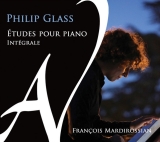Philip Glass komponierte seine 20 Etüden zwischen 1994 und 2012 und gruppierte sie in zwei Bänden. Der Komponist ließ einmal verlauten, dass das erste Buch, das aus Arbeiten zwischen 1991 und 2012 zusammengestellt wurde, ein doppeltes Ziel verfolgte: « …eine Vielzahl von Tempi, Texturen und Klaviertechniken zu erkunden. Gleichzeitig sollte es als pädagogisches Werkzeug dienen, mit dem ich mein Klavierspiel verbessern konnte. »
François Mardirossian gelingt es recht gut, die einzelnen Etüden zu differenzieren und das Beste aus ihrem Minimalismus zu machen, d.h. sie nicht langweilig und einfach repetitiv werden zu lassen.
Aber das haben andere Pianisten auch geschafft, denn es gibt schließlich schon eine Reihe von Aufnahmen dieser Etüden. Leider haben Mardirossians abwechslungsreiches Spiel und seine Klangphantasie einen erheblich mitmischenden Gegner: die Tonaufnahme. Sie ist weiträumig, mit einem allzu verschwommenen Klang, welcher der Intimität der Musik abträglich ist. Das will mir nun gar nicht gefallen, und ich ziehe daher die Aufnahmen von Jeroen van Veen oder Jenny Lin bei weitem vor, die in ebenfalls sehr persönlichen Interpretationen durch einen besseren Klang der Aufnahme gefallen. Mein Favorit bleibt Vikingur Olafsson, auch wenn dieser nicht alle Etüden aufgenommen hat.
Philip Glass composed his 20 Etudes between 1994 and 2012, grouping them into two volumes. The composer once let it be known that the first book, compiled from works written between 1991 and 2012, had a twofold goal: « …to explore a variety of tempos, textures, and piano techniques. At the same time, it was to serve as a pedagogical tool to improve my piano playing. »
François Mardirossian succeeds quite well in differentiating the individual Etudes and making the most of their minimalism, i.e., not letting them become boring and simply repetitive.
But other pianists have managed to do that as well; after all, there are already a number of recordings of these Etudes. Unfortunately, Mardirossian’s varied playing and his imagination have a considerably interfering opponent: the sound recording. It is spacious, with an overly hazy sound that detracts from the intimacy of the music. This does not appeal to me at all, and I therefore prefer by far the recordings of Jeroen van Veen or Jenny Lin, who, in also very personal interpretations, please with a better recorded sound. My favorite remains Vikingur Olafsson, even if he has not recorded all the etudes.
























